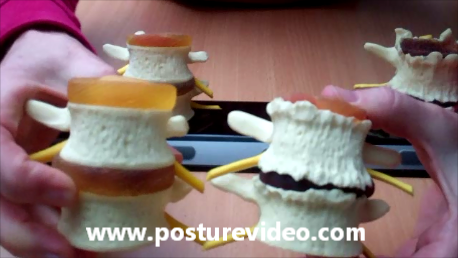Do you feel old but you’re not? Do you worry that you are beginning to look like your mother? Sorry mum, you know I love you. If your knees creak and your neck cracks and you feel like you’re older than your years, you need to read on.
Post Updated September, 2018
Even if you do creak, crackle and pop like a bowl of Rice Krispies, you might have arthritis. Here is a list of some of the signs and symptoms of osteoarthritis:
Free Posture Crash Course!
Discover the crazy, simple 3-step formula that will teach you how to improve your posture and flexibility like a pro. You will learn how to hardwire the habit of good posture, reduce forward head and the secret way to stop slouching. It's 100% free!
1. Age
That’s normal for your age – Five words you’ll never hear me say as a practitioner. What is normal anyway? If normal means that you ache and feel stiff in your forties and fifties, then poo poo to normal!
Some early wear and tear (aka osteoarthritis) in your forties may be somewhat common (but not normal) if you eat poorly, do not exercise and spend prolonged hours sitting and slouching over mobile devices.
Unfortunately, there is no escape from the effects of age-related sarcopenia or muscle loss. People who are physically inactive lose up to 5% of their muscle mass per decade from about age thirty. Yikes! Sarcopenia even occurs in active people, but not to the same degree.
Weight-bearing exercise is vital to keeping healthy bones and strong muscles. Hate the gym? A power walk is more than adequate and even better if you strap a couple 2kg weights to your wrists or ankles.
Does it take your body a little while to warm up in the morning? Do you wake stiff and inflexible? If this is you, you may have early signs of degenerative discs.
During the day, our sponge-like spinal discs reduce in size as liquid is squeezed out with the compressive force of being upright. The tissues that support our spinal alignment (ligaments and tendons) become slack and we feel more flexible during the day. When we sleep, our spinal discs reabsorb fluid and these holding tissues become taught and less flexible. This is more pronounced in a body whose discs already have degenerative changes.

Related: Posturecise – How to Create a Healthy Posture Habit for Life
3. Flatback Posture
If you’ve spent years sitting behind a desk, driving, doing manual labor, playing sport, and are over the age of 35, you might have a condition we call alordosis or flatback posture, where the pelvis tips backward (posterior tilt) and causes the spinal curves to flatten out.

My Advice: Don’t wait until the aches and pains are chronic. If you already recognize some of these signs and symptoms, spend some time now, learning about alordosis and get a wiggle on – Stay active when sitting and learn to fidget, wiggle and stir!
Further Resources: Sit Less Move More – Office desk exercise to improve posture
4. Limited Range Of Motion
Limited range of motion is a term meaning that a joint or body part cannot move through its normal range of motion. Loss of motion may occur if you damage or injure the bones within a joint. Limited range of motion may be a sign of arthritis and may happen if you have:
- a dislocation
- a broken bone
- an infected/swollen joint
- nerve or muscular disorders
- a joint fixation (a chiropractor or osteopath can help here)
Home Test: Turn your head as far as you can to the right and then as far as you can to the left. Is there an obvious difference? If you’re not sure, do this in front of a mirror. Next, side bend as far as you can to the right, without moving your pelvis or hips. Allow your fingers to track down the side of your leg. Do the same on the left side. Is there much of a difference? Finally, while sitting down, gently twist your body as far round as you can go to the right and then to the left. Do you have any obvious difference in your range of motion?
5. Your body feels old – but you haven’t even reached 50
I can’t tell you the number of times a student of mine has emailed to tell me they feel old but they are young. If you ask me, I’ll often ask you what you think is wrong. You may actually be the best judge of your own health. If you think you should be feeling better than you do, then you are probably right.
Related: Find out Your Biological Age
How accurate was your biological age?



